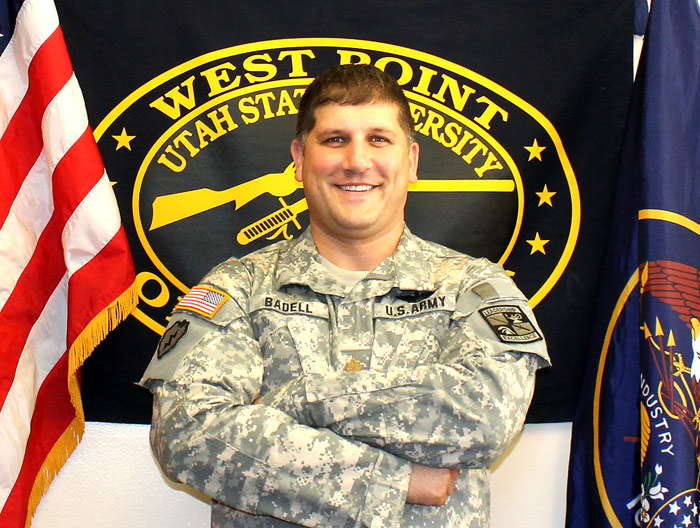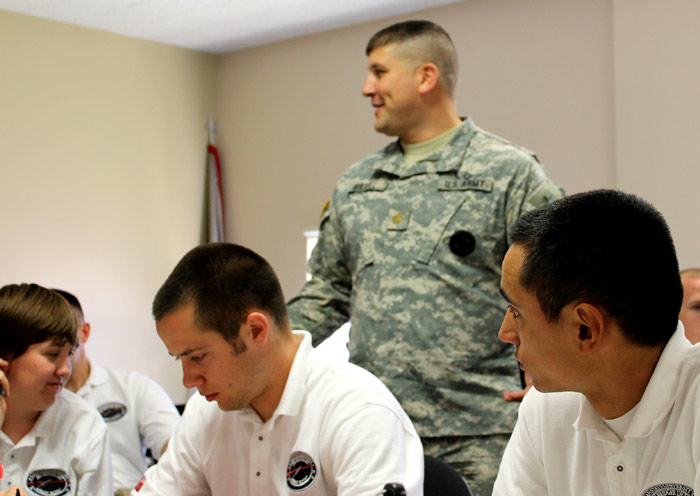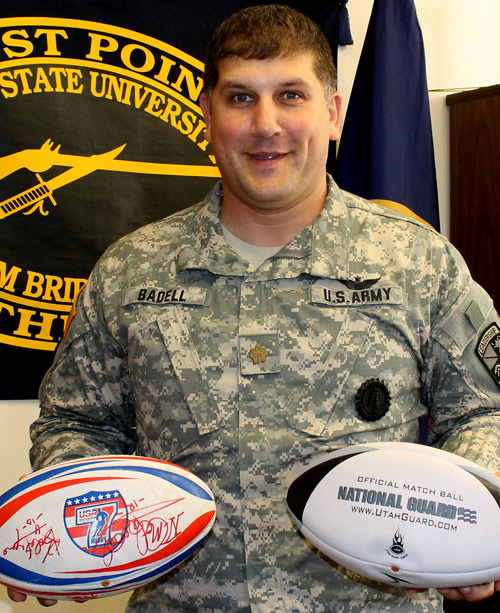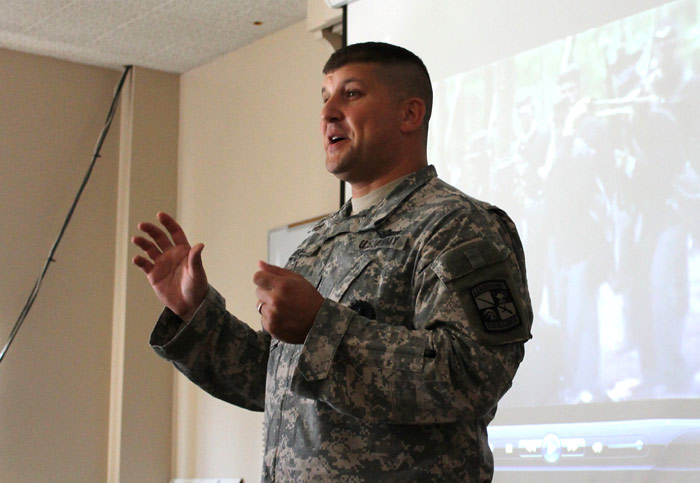For Army ROTC commander, leadership = service, integrity & humor
October 24th, 2011 Posted in Arts and LifeStory and Photos by Heidi Hansen
LOGAN—Attempting to control his energy as he bounces, fidgets and whistles while administering a timed-bell quiz, the 6-foot-plus man in an Army combat uniform isn’t giving away any clues that he might have something serious to teach his young cadets about leadership.
 Instructing three unprepared students to make an ‘L’ with their hands and hold it up to their foreheads, he chuckles, “It doesn’t mean you’re a loser, just that you’ve lost points.”
Instructing three unprepared students to make an ‘L’ with their hands and hold it up to their foreheads, he chuckles, “It doesn’t mean you’re a loser, just that you’ve lost points.”
But soon the laughter is pushed aside and they’re engaged in serious discussion.
Holding up a thick, red copy of the 51st Army Officer’s Guide, the Army officer explains that the book can teach “the art of war and science of tactics,” but it doesn’t teach officers everything they need to know.
Flipping open the book’s cover, he reveals pictures of men and friends he served with who died in a 2007 Apache helicopter crash near Cedar Valley, Utah. It was his responsibility to tell the families of these men that their husbands and fathers were not coming home.
“This book is a resource, but it won’t teach you how to talk to families,” he says. “That type of leadership comes from inside of you, it has to be there already. You have to bring it out.”
With intensity lighting his dark eyes, he coaxes his students to reflect on leading from the heart. “Consider what you would say.”
Meet Army Maj. Matthew Badell, a boisterous, charming and humble man who took over as the new Military Science Department head at Utah State University last spring, and who is now striving to teach his Reserve Officer Training Corps seniors that while leaders can demand respect, they get farther if they earn it.
Today, Badell lectures 29 future leaders, relying on a mixture of witty banter and teachings from great military leaders, interspersed with personal experience and introspection to get his message across.
 “This is the last phase of the military science program for them,” Badell said. “I focus on ethics, critical thinking and values. I tell them that leadership is about inspiring trust.
“This is the last phase of the military science program for them,” Badell said. “I focus on ethics, critical thinking and values. I tell them that leadership is about inspiring trust.
“I also try to be forward-thinking. I feel it’s my duty to prepare them for what they are going to do,” he adds. “So I try to present scenarios… try to steel their minds against future challenges so they can stick to their values.
“I want them to be proactive leaders, not reactive,” Badell says.
Currently pursuing a master’s degree in leadership, the seemingly natural-born leader—whose uniform displays pilot wings, a bronze star medal and an air medal—has been long in the making.
Somewhere after what one can only assume was an energetic childhood in Dover, Del., an LDS mission speaking Thai in Fresno, Calif., and wooing at attractive female student at BYU in Provo, Matthew Badell transformed from a man joining the Army because he possessed the necessary language skills to “a student of great people.”
Badell says that he was hooked on his wife, Rose, as soon as he met her. He began going to her classes more than his own, but he really knew she was the one when he told her he was joining the Army and she said, “If you think that’s going to be good for you, I support you.”
Today, the proud papa of three adopted children, Badell says, “I define greatness by the legacy [people] left or the life they led.” Some favorite “great people” represented on Badell’s office bookshelf include Martin Luther King Jr., Ghandi and Jim Collins. Unwilling to let his bookshelf be photographed, he guiltily explains that he recently read Decision Points by George W. Bush, too.
While Badell talks a lot, he clearly has a difficult time bragging about himself. When thanked for his service, Badell’s pat response is, “Don’t thank me, thank her,” pointing to his wife.
Badell has received many medals and awards, but he’s reluctant to talk about them, instead pulling a big cardboard box out from under his desk, revealing a mountain of green folders containing award certificates.
“Everything good you do in the Army should be recognized,” Badell said. “You don’t get awarded for doing your job, but when you go above and beyond, that should be recognized.
 “I am humbled by my commanders recognizing me, but always grateful for those who sacrificed more,” he said.
“I am humbled by my commanders recognizing me, but always grateful for those who sacrificed more,” he said.
One of those above-and-beyond recognitions is the bronze star, given for meritorious service in combat. “There are people who got this award who died, so I gave a lot, but I didn’t give everything,” he said. “I don’t ever want to forget the sacrifice of others.”
But Badell’s former commanding officers aren’t hesitant to praise him.
When Badell came to USU in April, he left his position as deputy commander of the Recruiting and Retention Battalion of the Utah Army National Guard in Draper, where he was awarded the meritorious service medal for his work.
Adj. Gen. Brian L. Tarbet wrote that Badell was instrumental in the Utah Army National Guard station becoming the No. 1 recruiting battalion in the nation during wartime.
“He is a great mentor and leader to all those he comes in contact with,” Tarbet wrote, “and he has the energy necessary to motivate those he leads.”
Maj. Gen. Eric T. Olson, who recommended Badell for the air medal for his performance in Afghanistan, wrote, “Captain Badell is an excellent soldier who always seeks to build the team. His ability to maintain constant situational awareness, coupled with his air warrior skills enabled him to ensure mission success….”
His USU cadets are also interested in heaping praise. Sounding as though they’ve memorized Badell’s entire military fact sheet, his students proudly recite the high points they think most relevant to their instructor’s life story: “Went to BYU. Married a girl. Speaks Thai, Korean, Lao and Latin. Served in Afghanistan. Worked in recruiting.”
They also agreed that he’s a fine instructor and leader, although senior Aaron Wolcott offered one small criticism: “He’s always late for class and he always goes over time.”
But it’s a hard thing for Badell, a leader more focused on serving others than in personal glory or recognition, to talk about his own achievements. When asked about his involvement in the Orem-based Afghan Orphan Project, he dodges the question, simply stating, “I’m on the board.”
Afghan Orphan Project President Layne Pace, along with a group of volunteers, including Badell, began delivering donated shoes, coats, soap and other supplies directly to Afghan orphanages, villages and coalition hospitals in 2004. Today, the non-profit organization has “adopted” two orphanages in Afghanistan, meaning they specifically focus on delivering supplies to and helping these orphanages first.
The group recently helped one 17-year-old orphan girl obtain a prosthetic leg, and is now funding her studies in Afghanistan, Badell said, adding that she stayed in his home over Christmas.
“The fact is we were not deployed to Bosnia—we were deployed to Afghanistan, so that is where we are helping,” Badell said. “There are many hands that have contributed to the success of the Afghan Orphan Project thus far. I am proud to be one of the people who have helped.”
It’s this humble attitude—the selfless desire to lead, to earn respect, to build trust—that likely endears him to the high school student body officers he teaches about freedom and leadership each summer during a one-week camp at the Utah Freedom Academy.
As director of the Utah Freedom Academy, a Utah National Guard-sponsored program, Badell helps students get the chance to visit places like Bluffdale prison, ABC2 news and the Utah Air National Guard base, where they climb the repel tower, participate in the flag ceremony and shoot M16’s.
“There is no other place like this in the country,” Badell said about Freedom Academy, which sounds more like a program for troubled teens than for high school leaders, “where we take good kids and help them focus on being better.”
Badell also takes a more unique approach to provide service every summer by “hosting” the Fiji International Rugby team in Las Vegas. An amateur rugby player himself, Badell says he loves the chance to help out the Fiji team. It’s his job to get them to the hotel and tournament safely.
Badell’s values—loyalty, duty, respect, selfless service, honor, integrity and personal courage—line up with the Army values he’s trying to teach his ROTC students at USU, informally called the “West Point of the West” because of how many Army officers it has commissioned over its long, history.
 And the training shows. “I have found it valuable to go to [ROTC officer] commissionings,” said John C. Allen, dean of the College of Humanities and Social Sciences, which houses both the Army and Air Force ROTC programs at USU. “I see these young people walk out with values I had not expected.”
And the training shows. “I have found it valuable to go to [ROTC officer] commissionings,” said John C. Allen, dean of the College of Humanities and Social Sciences, which houses both the Army and Air Force ROTC programs at USU. “I see these young people walk out with values I had not expected.”
While not all military science students are commissioned, and not all commissioned officers are graduates of the ROTC program, the ones at USU seem to be benefitting from Badell’s leadership expertise.
In a recent class, Badell spoke with humor and clarity about Joshua L. Chamberlain, a Union commander in the Civil War who was able to get deserters to rejoin the fight by treating them with dignity and building a trusting relationship.
“I submit to you that it was all leadership,” Badell said, standing still for a moment. “If you’re going to be in the Army, you need to be trustworthy. When circumstances were dire, those men followed a leader they trusted.”
But in a daring feat of mood agility, Badell goes on to speak in a staccato voice: “Now I’m going to wax philosophical and introspective, like you know I like to do.”
Quickly returning to a smooth tone with a serious look in his brow, he charges his students to once again reflect. “I ask, have you betrayed yourself? Have you not lived up to your ideal? Have you done something to bring dishonor to yourself or the Army? Are you building trust?”
He gives out directions for next week’s writing assignment. “Move your head in a vertical plane if you understand,” he laughs.
Class dismissed.
TP

5 Responses to “For Army ROTC commander, leadership = service, integrity & humor”
By Nathan on Oct 24, 2011
That’s my brother!
By Natalie Simmons on Oct 29, 2011
Thank you Heidi for such a well written article. I think you captured his character, integrity and humor perfectly. I should know, I\’m his sister. Thank you so much. I was moved to tears. Well done!
By Connie Smith on Oct 29, 2011
What a beautifully written article. I am so proud of my nephew and all that he stands for. He has always been a leader and role model.
By Robert Price on Oct 29, 2011
A great man from a great and loving family!
By Robert Price on Oct 29, 2011
A great man from a loving family !